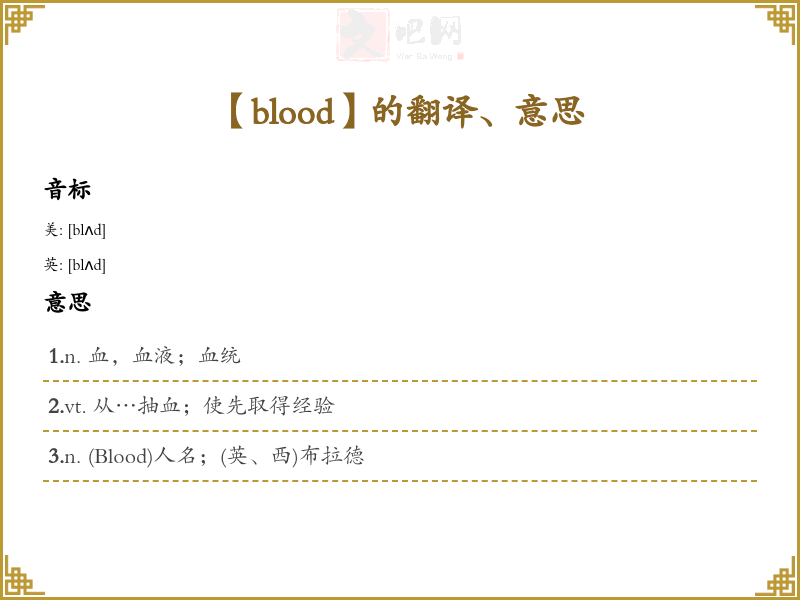【blood】的翻译、意思
时间: 2025-01-25 23:17:49
【blood】怎么读
美:[blʌd]
英:[blʌd]
【blood】是什么意思、字义解释
1. n. 血,血液;血统
2. vt. 从…抽血;使先取得经验
3. n. (Blood)人名;(英、西)布拉德
【blood】的详细解释
英文单词学*与分析:[blood]
1. 基本定义:
- 字面意思:Blood refers to the red liquid that circulates in the bodies of humans and animals, carrying oxygen and nutrients to the cells and removing waste products.
- 定义:Blood is a vital fluid composed of red and white blood cells, platelets, and plasma, enabling bodily functions such as transportation of substances, regulation of temperature, and immune response.
- 词性:名词 (noun)
2. 词源与起源:
-
词源分析:The word "blood" comes from Old English "blōd," which is derived from Proto-Germanic blōð, meaning "blood, gore." Its roots can be traced back to Proto-Indo-European bʰle- meaning "to swell" or "to flow."
-
历史背景:The first recorded use of "blood" dates back to the 9th century in Old English texts. It has been used in various literary works, including references in religious texts like the Bible.
-
课本:在**的英语教材中,"blood" 可能出现在初中和高中阶段的生物学或健康教育课程中。牛津大学的教材通常会在初中阶段的基础英语课程中介绍该词,而美国的教材会在生物学和健康课程中使用。
3. 使用场景:
-
正式与非正式语境:
- 正式语境:在医学、科学研究或法律文献中经常使用,如“血液样本分析”。
- 非正式语境:在日常交流中,常用作表达亲情或友谊,例如“我们是同血同根的兄弟姐妹。”
-
特殊场合:在法律中,“blood”常用作术语,如“blood money”(赎金)或“bloodline”(血统)。在医学中,用于描述血液疾病,如“blood cancer”(血癌)。
4. 示例句子:
-
Blood is essential for transporting oxygen throughout the body.
- 血液对运输全身的氧气至关重要。
-
He donated blood to help those in need.
- 他捐献血液以帮助有需要的人。
-
The doctor took a blood sample for testing.
- 医生抽取了血样进行检测。
-
Their blood relationship is very strong.
- 他们的血缘关系非常牢固。
-
The crime scene was analyzed for blood evidence.
- 犯罪现场被分析以寻找血液证据。
*. Blood pressure is a critical indicator of health.
- 血压是健康的重要指标。
-
She felt a rush of blood to her face when she heard the news.
- 当她听到那个消息时,脸上感到一阵血压上升。
-
The novel explores themes of blood and sacrifice.
- 这部小说探讨了血与牺牲的主题。
-
Blood tests can reveal many underlying health issues.
- 血液测试可以揭示许多潜在的健康问题。
-
He has a strong bloodline of athletes in his family.
- 他家族中有着强大的**员血统。
5. 同义词与反义词:
-
同义词:
- Vital fluid:强调血液在身体中的重要性。
- Lifeblood:指生命所需的关键成分,通常在比喻中使用。
-
反义词:
- Death:与血液的生命功能相对,表示生命的终结。
- Hollow:在某种程度上可以作为反义词,暗示缺乏生机或活力。
. 学方法:
- 音标记忆法:记忆音标 /blʌd/,通过重复发音来加深印象。
- 谐音联想记忆:可以联想“血液”(blood)与“布”(布料)发音相近,通过想象“血液浸泡在布上”来帮助记忆。
7. 关联词汇:
- blood type(血型)
- blood test(血液测试)
- blood vessel(血管)
- blood donation(献血)
- blood pressure(血压)
- blood sugar(血糖)
- blood cell(血细胞)
通过以上分析,希望能帮助你更好地理解和记忆单词 "blood" 的相关知识。
【blood】例句
1、[N-UNCOUNT] Blood is the red liquid that flows inside your body, which you can see if you cut yourself. 血液
例:His shirt was covered in blood.他的衬衫沾满了血。
2、[N-UNCOUNT] You can use blood to refer to the race or social class of someone's parents or ancestors. 血统
例:There was Greek blood in his veins: his ancestors originally bore the name Karajannis.他有希腊血统——他的祖先原来姓卡拉扬尼斯。
3、[PHRASE] If you say that there is bad blood between people, you mean that they have argued about something and dislike each other. 积怨
例:There is, it seems, some bad blood between Mills and the Baldwins.米尔和鲍德温两家看上去好像有积怨。
4、[[表不满]] If something violent and cruel is done in cold blood, it is done deliberately and in an unemotional way. 残忍蓄意地
例:The crime had been committed in cold blood.这起案件是蓄意犯罪。
5、[PHRASE] If you say that someone has a person's blood on their hands, you mean that they are responsible for that person's death. 应对某人的死亡负责
例:He has my son's blood on his hands. I hope it haunts him for the rest of his days.他应该对我儿子的死负责,但愿他终生不得安宁。
6、[PHRASE] If a quality or talent is in your blood, it is part of your nature, and other members of your family have it too. 天生遗传的
例:Diplomacy was in his blood: his ancestors had been feudal lords.他的外交能力是天生的:他的祖上曾是封建王侯。
7、[PHRASE] You can use the expressions new blood, fresh blood, or young blood to refer to people who are brought into an organization to improve it by thinking of new ideas or new ways of doing things. 新生力量
例:There's been a major reshuffle of the cabinet to bring in new blood.内阁进行了重大改组以吸纳新生力量。
